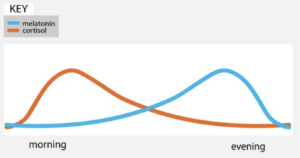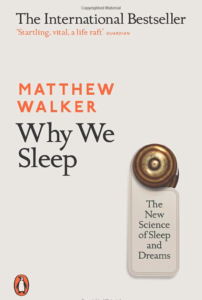Why We Sleep - Matthew Walker
- InPsych
- September 16, 2023
- 3 Comments
- Book Reviews
Why Do We Sleep?
Every living thing sleeps. From an evolutionary standpoint, this seems strange. Why have we evolved to sleep roughly 1/3 of our lives, during which we’re unable to eat and procreate and very vulnerable to attack. Surely it makes more sense for us to have as little sleep as possible, to be alert, ready and active all the time.
The answer to this question lies with the evolution of the suprachiasmatic nucleus, located behind the eyes and in charge of the famous process known as the circadian rhythm. Its existence can be traced to our earliest organic ancestors, when we were little, tiny cells hundreds of millions of years ago. They developed a 24-hour biological clock so they could coordinate metabolism, temperature regulation, energy conservation, predator avoidance, and others, in response to the light of the sun. This fundamental process has remained hugely important amongst these cells’ descendants, although now vast and complex neural networks have grown alongside it.
Walker talks about some interesting examples that evidence the diversity of sleep adaptation and evolution. For example, birds that migrate months at a time take microsleeps of seconds at a time, meaning they never have to land. Some sea animals such as whales and dolphins sleep with half of their brain at a time, allowing some functions to go on while the others rest.
The many benefits of sleep are made clear through the book, and it becomes obvious why it has remained such an integral part of our evolution. All supported by academic research, his findings are staggering, ranging from the obvious: better physical health (stronger immune system, more efficient healing and repair) better cognitive function (improved memory, learning, decision-making) better emotional regulation (better stress management, improved stability) to the less obvious: weight loss, self-confidence, longer life, creativity and even as a recognised contributor to the prevention of cancer and dementia. These extraordinary benefits are only compounded by the potential downsides to not getting enough sleep.
Why Do We Dream?
Walker’s general thesis is that dreaming acts as ‘overnight therapy’. While we sleep, the emotions connected to the experiences of the day are processed from short-term memory to long-term memory. That’s why you’ll probably have noticed that the people and things you’ve encountered more recently crop up in your dreams.
The only time our brain shuts off the anxiety molecule noradrenaline is during REM sleep. At the same time, the brain activates emotional and memory related centres. In other words, this is the only time your brain digests memories free from stress-related neurochemicals, allowing for emotional reprocessing in a safer, calmer environment.
A common symptom of those suffering from PTSD is disrupted sleep, nightmares and other such sleep-related issues. Walker argues that this occurs because of a type of ‘blockage’ formed from their traumatic experience. This prevents the processing of emotionally distressing memories into the less intense, less active long-term memory.
How Can I Sleep Better?
Unfortunately, Walker describes how the modern, developed world has really negatively impacted the way we sleep. New, highly addictive technologies, mass availability of sleeping pills and an education system with early starts and unfortunately for me, no consideration for those who like napping (He argues this is an important and healthy sleeping habit).
The key to sleeping well is establishing a good cortisol–melatonin cycle (i.e., a healthy circadian rhythm). Obviously, the graph below is extremely simplistic, but it gets the main idea across.

When you wake up, you want your cortisol (the ‘stress hormone’) to be high. I trigger this by having a blast of freezing shower in the morning. As the day goes on, it should gradually decrease so that by bedtime you’re nice and relaxed. Melatonin (the ‘sleep hormone’) should start low and gradually increase so that by bedtime your brain knows it’s time to sleep.
As a bonus, I’ve included a few items from his Twelve Tips for Healthy Sleep that I think are quite useful.
- Stick to a sleep schedule! This is his most important piece of advice. Both going to bed and waking up at similar times play a huge role in regulating your circadian rhythm, and as sleep debt and credit doesn’t really exist, this includes weekends as well.
- Avoid caffeine, nicotine, alcohol and LED screens before bed. Caffeine and nicotine are both stimulants and shouldn’t be consumed after the late afternoon. Caffeine’s half-life is about 5 hours. Alcohol, while it may help to relax, robs you of solid REM sleep during which a lot the important stuff happens. The blue light off LED screens prevents melatonin production.
- Daylight! Getting natural sunlight (or if unavailable, very bright lights) at least thirty minutes a day as early as possible will do wonders for stimulating that early cortisol production and helping to regulate your circadian rhythm. (I have a sunrise lamp that makes waking up much more pleasant than the iPhone alarm noise and I would highly recommend.)


Super interesting, and very clearly explained!
Love this. I’m going to be implementing some of these sleeping tips!! And we need to normalise napping for people other than babies and students. City planners should facilitate day time naps for workers/tourists/ everyone!
I would very much be in favour.